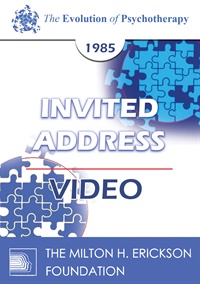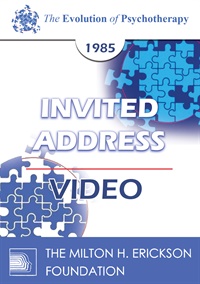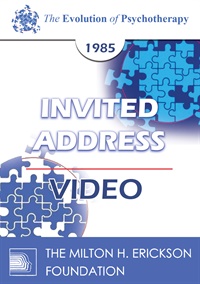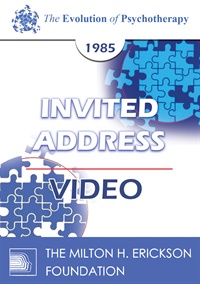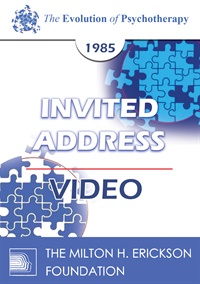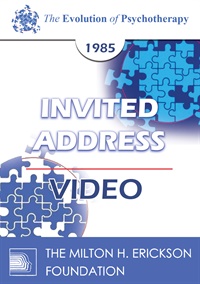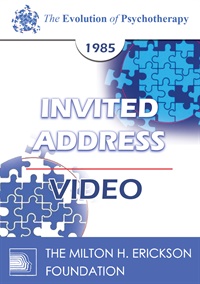- Average Rating:
- Not yet rated
- Topic Areas:
- Invited Addresses | Family Therapy | Psychotherapy | Family Systems | Supervision | Therapist Development | History of Psychotherapy
- Categories:
- Evolution of Psychotherapy | Evolution of Psychotherapy 1985 | Pioneers in Couples and Family Therapy
- Faculty:
- Salvador Minuchin, MD | Zerka Moreno
- Course Levels:
- Master Degree or Higher in Health-Related Field
- Duration:
- 1:20:57
- Format:
- Audio and Video
- Original Program Date:
- Dec 12, 1985
- Short Description:
- This conversation brings together two influential voices reflecting on the development of family therapy. Salvador Minuchin traces its shift from holistic, family-focused care to an individual diagnostic model, and back again. He underscores the importance of adapting therapeutic strategies to the family’s structure and context. Zerka Moreno shares the power of action-oriented methods like psychodrama, highlighting how family members often relate more to imagined roles than to one another. Moderated by Sharon Cottor, MSW.
- Price:
-
Sale is $29.00
price reduced from Base Price - $59.00
- Average Rating:
- Not yet rated
- Topic Areas:
- Invited Addresses | Psychotherapy | Therapist Development | History of Psychotherapy | Reframing | Resistance | Systems Theory | Brief Therapy | Strategic Therapy
- Categories:
- Evolution of Psychotherapy | Evolution of Psychotherapy 1985 | Pioneers in Couples and Family Therapy
- Faculty:
- Paul Watzlawick, PhD | Ernest Rossi, PhD
- Course Levels:
- Master Degree or Higher in Health-Related Field
- Duration:
- 1:20:53
- Format:
- Audio and Video
- Original Program Date:
- Dec 12, 1985
- Short Description:
- Watzlawick explores the evolution of therapeutic language from insight to action, critiquing linear models in favor of systemic, behavior-focused approaches. Drawing on figures like Franz Alexander, Jean Piaget, and Milton Erickson, he illustrates how change often begins by acting "as if" transformation is possible. Through performative techniques and behavioral prescriptions, therapists can help shift perceived reality and foster meaningful adaptation.
- Price:
-
Sale is $29.00
price reduced from Base Price - $59.00
- Average Rating:
- Not yet rated
- Topic Areas:
- Invited Addresses | Existential Therapy | Psychotherapy | Phenomenology
- Categories:
- Evolution of Psychotherapy | Evolution of Psychotherapy 1985
- Faculty:
- Ronald Laing, MD | Thomas Szasz, MD
- Course Levels:
- Master Degree or Higher in Health-Related Field
- Duration:
- 1:26:01
- Format:
- Audio and Video
- Original Program Date:
- Dec 12, 1985
- Short Description:
- Educational Objectives: To know the theory behind the use of social phenomenology and existential philosophy in psychotherapy
- Price:
-
Sale is $29.00
price reduced from Base Price - $59.00
- Average Rating:
- Not yet rated
- Topic Areas:
- Invited Addresses | Redecision Therapy | Transactional Analysis | Psychotherapy | Brief Therapy
- Categories:
- Evolution of Psychotherapy | Evolution of Psychotherapy 1985
- Faculty:
- Mary Goulding, MSW | Jeffrey Zeig, PhD
- Course Levels:
- Master Degree or Higher in Health-Related Field
- Duration:
- 1:19:17
- Format:
- Audio and Video
- Original Program Date:
- Dec 12, 1985
- Short Description:
- Invited Address Session 5 - Part 1 - Transactional Analysis and Redecision: A Short-Term, Focused Approach to Change featuring Mary M. Goulding, MSW. With discussant Jeffrey K Zeig, PhD. Moderated by Theodore Reid, Jr, MD.
- Price:
-
Sale is $29.00
price reduced from Base Price - $59.00
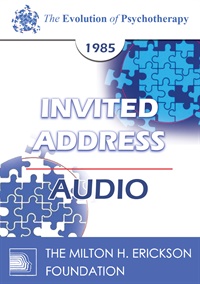
- Average Rating:
- Not yet rated
- Topic Areas:
- Invited Addresses | Virginia Satir | Group Therapy | Psychotherapy
- Categories:
- Evolution of Psychotherapy | Evolution of Psychotherapy 1985 | Pioneers in Couples and Family Therapy
- Faculty:
- Robert L. Goulding, MD | Virginia Satir, MA, ACSW
- Duration:
- 1 Hour 15 Minutes
- Format:
- Audio Only
- Original Program Date:
- Dec 12, 1985
- Short Description:
- Invited Address Session 5 - Part 2 - Group Therapy: Mainline or Sideline? featuring Robert L. Goulding, MD. With discussant Virginia M Satir, ACSW. Moderated by F. Theodore Reid, Jr, MD.
- Price:
- $15.00 - Base Price
- Average Rating:
- Not yet rated
- Topic Areas:
- Invited Addresses | Psychotherapy | Healing | Visualization | Post-Traumatic Stress Disorder (PTSD)
- Categories:
- Evolution of Psychotherapy | Evolution of Psychotherapy 1985 | Pioneers in Couples and Family Therapy
- Faculty:
- Virginia Satir, MA, ACSW | Carl Whitaker, MD | Albert Ellis, PhD
- Course Levels:
- Master Degree or Higher in Health-Related Field
- Duration:
- 1:25:51
- Format:
- Audio and Video
- Original Program Date:
- Dec 13, 1985
- Short Description:
- Satir emphasizes the importance of engaging clients' emotional and physical experiences, using storytelling, historical context, and non-verbal communication to create meaningful therapeutic connections. Moderated by Camillo Loriedo.
- Price:
-
Sale is $29.00
price reduced from Base Price - $59.00
- Average Rating:
- Not yet rated
- Topic Areas:
- Invited Addresses | Family Therapy | Psychotherapy
- Categories:
- Evolution of Psychotherapy | Evolution of Psychotherapy 1985 | Pioneers in Couples and Family Therapy
- Faculty:
- Carl Whitaker, MD | Albert Ellis, PhD
- Course Levels:
- Master Degree or Higher in Health-Related Field
- Duration:
- 1:28:51
- Format:
- Audio and Video
- Original Program Date:
- Dec 13, 1985
- Short Description:
- Carl Whitaker explores family therapy through a systemic lens, emphasizing therapists' role in understanding family dynamics, unconscious processes, and strategic communication. Challenging traditional therapeutic approaches, he advocates for collaborative, boundary-aware interventions that support family transformation and emotional growth. With discussants Albert Ellis and Virginia Satir Moderated by Camillo Loriedo
- Price:
-
Sale is $29.00
price reduced from Base Price - $59.00
Tags: Family Therapy Psychotherapy Carl Whitaker Adaptive Learning Attunement Autonomy Behavioral Change Emotional Growth Experiential Learning Expressive Communication Flexibility Metaphor Therapy Naturalistic Change Observation Phenomenological Approach Problem-Solving Therapy Rapport Receptive Communication Reframing Self-Discovery Storytelling Strategic Therapy Tailoring Therapeutic Alliance Unconscious Resources Utilization Validation
- Average Rating:
- Not yet rated
- Topic Areas:
- Invited Addresses | Psychotherapy | Therapist Development
- Categories:
- Evolution of Psychotherapy | Evolution of Psychotherapy 1985
- Faculty:
- Bruno Bettelheim | Ronald Laing, MD
- Course Levels:
- Master Degree or Higher in Health-Related Field
- Duration:
- 1:28:20
- Format:
- Audio and Video
- Original Program Date:
- Dec 13, 1985
- Short Description:
- Educational Objectives: To know the Indications and essentials for residential treatment To know the staffing pattern required for residential treatment To know the likely outcomes of residential treatment
- Price:
-
Sale is $29.00
price reduced from Base Price - $59.00
- Average Rating:
- Not yet rated
- Topic Areas:
- Invited Addresses | Object Relations Theory | Psychotherapy
- Categories:
- Evolution of Psychotherapy | Evolution of Psychotherapy 1985 | Pioneers in Couples and Family Therapy
- Faculty:
- James F. Masterson, MD | Jay Haley, MA
- Course Levels:
- Master Degree or Higher in Health-Related Field
- Duration:
- 1:22:04
- Format:
- Audio and Video
- Original Program Date:
- Dec 13, 1985
- Short Description:
- Educational Objectives: To describe the process that integrates the developmental perspective with object relations theory To illustrate how the personal relates to the professional in the development of a theory
- Price:
-
Sale is $29.00
price reduced from Base Price - $59.00
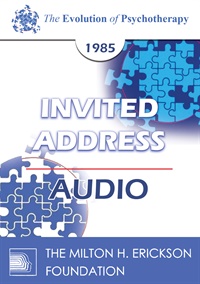
- Average Rating:
- Not yet rated
- Topic Areas:
- Invited Addresses | Psychotherapy
- Categories:
- Evolution of Psychotherapy | Evolution of Psychotherapy 1985
- Faculty:
- Joseph Wolpe, M.D. | Judd Marmor
- Duration:
- 1 Hour 22 Minutes
- Format:
- Audio Only
- Original Program Date:
- Dec 13, 1985
- Short Description:
- Invited Address Session 8 - Part 1 - The Promotion of Scientific Psychotherapy: A Long Voyage featuring Joseph Wolpe, MD. With discussant Judd Marmor, MD. Moderated by Harold Arkowitz, PhD.
- Price:
- $15.00 - Base Price
Tags: Joseph Wolpe Psychotherapy
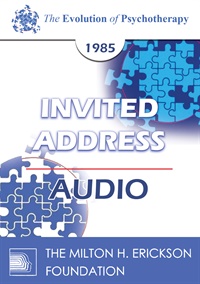
- Average Rating:
- Not yet rated
- Topic Areas:
- Invited Addresses | Psychotherapy | Religion
- Categories:
- Evolution of Psychotherapy | Evolution of Psychotherapy 1985
- Faculty:
- Thomas Szasz, MD | Rollo May, PhD
- Duration:
- 1 Hour 21 Minutes
- Format:
- Audio Only
- Original Program Date:
- Dec 13, 1985
- Short Description:
- Invited Address Session 8 - Part 2 - Justifying Coercion Through Theology and Therapy featuring Thomas S Szasz, MD. With discussant Rollo R May, PhD. Moderated by Harold Arkowitz, PhD.
- Price:
- $15.00 - Base Price
- Average Rating:
- Not yet rated
- Topic Areas:
- Invited Addresses | Psychotherapy | History of Psychotherapy | Cultural and Social Contexts | Family Therapy | Strategic Therapy
- Categories:
- Evolution of Psychotherapy | Evolution of Psychotherapy 1985 | Pioneers in Couples and Family Therapy
- Faculty:
- Jay Haley, MA | Salvador Minuchin, MD
- Course Levels:
- Master Degree or Higher in Health-Related Field
- Duration:
- 1:12:25
- Format:
- Audio and Video
- Original Program Date:
- Dec 14, 1985
- Short Description:
- An address that examines Haley's paper discussing the evolution of therapy as an interpersonal practice shaped by social context and the influence of Milton Erickson. Highlighted is the shift toward brief, behavior-focused methods and the reliance on personal therapy is critiqued. The paper also addresses challenges in defining change, measuring outcomes, and how cultural trends shape therapeutic approaches. Salvador Minuchin offers a critique.
- Price:
-
Sale is $29.00
price reduced from Base Price - $59.00
- Average Rating:
- Not yet rated
- Topic Areas:
- Invited Addresses | Psychotherapy | Family Therapy | Strategic Therapy | Humor
- Categories:
- Evolution of Psychotherapy | Evolution of Psychotherapy 1985 | Pioneers in Couples and Family Therapy
- Faculty:
- Cloe Madanes, HDL, LIC | Paul Watzlawick, PhD
- Course Levels:
- Master Degree or Higher in Health-Related Field
- Duration:
- 51:08
- Format:
- Audio and Video
- Original Program Date:
- Dec 14, 1985
- Short Description:
- Cloe Madanes presents strategic family therapy, focusing on shifting from individual to family-based approaches. She outlines techniques like reversing family hierarchies and prescribing symptom roles to create change, emphasizing the use of humor and playfulness. Discussant Dr. Watzlawick critiques the approach for potentially fostering dependence and lacking diagnostic clarity, while also examining the complexities of paradox and subjective reality in therapeutic work. Moderated by William McLeod, MD.
- Price:
-
Sale is $29.00
price reduced from Base Price - $59.00
- Average Rating:
- Not yet rated
- Topic Areas:
- Invited Addresses | Psychotherapy | Therapeutic Relationship | Therapist Development
- Categories:
- Evolution of Psychotherapy | Evolution of Psychotherapy 1985
- Faculty:
- Judd Marmor | Aaron Beck, MD
- Course Levels:
- Master Degree or Higher in Health-Related Field
- Duration:
- 1:39:02
- Format:
- Audio and Video
- Original Program Date:
- Dec 14, 1985
- Short Description:
- Invited Address Session 10 - Part 1 - The Nature of the Psychotherapeutic Process featuring Judd Marmor, MD. With discussant Aaron T Beck, MD. Moderated by Stuart M Gould, Jr, MD.
- Price:
-
Sale is $29.00
price reduced from Base Price - $59.00
- Average Rating:
- Not yet rated
- Topic Areas:
- Invited Addresses | Psychotherapy
- Categories:
- Evolution of Psychotherapy | Evolution of Psychotherapy 1985
- Faculty:
- Lewis R Wolberg, M.D. | Arnold Lazarus, Ph.D.
- Course Levels:
- Master Degree or Higher in Health-Related Field
- Duration:
- 1:29:09
- Format:
- Audio and Video
- Original Program Date:
- Dec 14, 1985
- Short Description:
- Invited Address Session 10 - Part 2 - The Evolution of Psychotherapy: Future Trends featuring Lewis R Wolberg, MD. With discussant Arnold A Lazarus, PhD. Moderated by Stuart M Gould, Jr, MD.
- Price:
-
Sale is $29.00
price reduced from Base Price - $59.00
Tags: Lewis Wolberg Psychotherapy
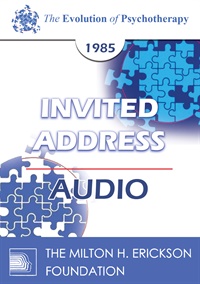
- Average Rating:
- Not yet rated
- Topic Areas:
- Invited Addresses | Gestalt | Psychotherapy
- Categories:
- Evolution of Psychotherapy | Evolution of Psychotherapy 1985
- Faculty:
- Miriam Polster | Robert L. Goulding, MD
- Duration:
- 1 Hour 11 Minutes
- Format:
- Audio Only
- Original Program Date:
- Dec 14, 1985
- Short Description:
- Invited Address Session 11 - Part 1 - Gestalt Therapy: Evolution and Application featuring Miriam Polster, PhD. With discussant Robert L Goulding, MD. Moderated by F Theodore Reid, Jr, MD.
- Price:
- $15.00 - Base Price
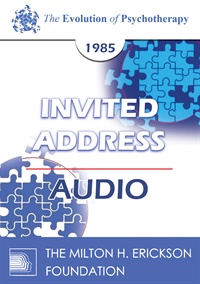
- Average Rating:
- Not yet rated
- Topic Areas:
- Invited Addresses | Storytelling | Psychotherapy
- Categories:
- Evolution of Psychotherapy | Evolution of Psychotherapy 1985
- Faculty:
- Erving Polster, PhD | Carl Rogers, PhD
- Duration:
- 1 Hour 20 Minutes
- Format:
- Audio Only
- Original Program Date:
- Dec 14, 1985
- Short Description:
- Description: With discussant Carl R Rogers, PhD. Moderated by F Theodore Reid, Jr, MD. Educational Objectives: To describe three ways of evoking stories in therapy. To name two purposes served by storytelling.
- Price:
- $15.00 - Base Price
- Average Rating:
- Not yet rated
- Topic Areas:
- Invited Addresses | Psychotherapy | Milton Erickson
- Categories:
- Evolution of Psychotherapy | Evolution of Psychotherapy 1985
- Faculty:
- Carl Rogers, PhD | Ruth Sanford, MA | Miriam Polster
- Course Levels:
- Master Degree or Higher in Health-Related Field
- Duration:
- 1:31:20
- Format:
- Audio and Video
- Original Program Date:
- Dec 15, 1985
- Short Description:
- Invited Address Session 12 - Part 1 - Rogers, Kohut, and Erickson: A Personal Perspective on Some Similarities and Differences featuring Carl Rogers, PhD, and Ruth C Sanford, MA. With discussant Miriam Polster, PhD. Moderated by F Theodore Reid, Jr, MD.
- Price:
-
Sale is $59.00
price reduced from Base Price - $59.00
- Average Rating:
- Not yet rated
- Topic Areas:
- Invited Addresses | Existential Therapy | Psychotherapy
- Categories:
- Evolution of Psychotherapy | Evolution of Psychotherapy 1985
- Faculty:
- Bruno Bettelheim | Rollo May, PhD
- Course Levels:
- Master Degree or Higher in Health-Related Field
- Duration:
- 1:26:32
- Format:
- Audio and Video
- Original Program Date:
- Dec 15, 1985
- Short Description:
- Invited Address 12 - Part 2 - Existential Therapy and the Future, featuring Rollo R May, PhD. With discussant Bruno Bettelheim, PhD. Moderated by F Theodore Reid, Jr, MD.
- Price:
-
Sale is $29.00
price reduced from Base Price - $59.00
- Average Rating:
- Not yet rated
- Topic Areas:
- Invited Addresses | Cognitive Behavior Therapy (CBT) | Rational Emotive Behavior Therapy (REBT) | Psychotherapy
- Categories:
- Evolution of Psychotherapy | Evolution of Psychotherapy 1985
- Faculty:
- Albert Ellis, PhD | Mary Goulding, MSW
- Course Levels:
- Master Degree or Higher in Health-Related Field
- Duration:
- 1:26:48
- Format:
- Audio and Video
- Original Program Date:
- Dec 15, 1985
- Short Description:
- Invited Address Session 13 - Part 1 - The Evolution of Rational-Emotive Therapy (RET) and Cognitive Behavior Therapy (CBT) featuring Albert Ellis, PhD. With discussant Mary M Goulding, MSW. Moderated by Aaron H Canter, PhD.
- Price:
-
Sale is $29.00
price reduced from Base Price - $59.00
- Average Rating:
- Not yet rated
- Topic Areas:
- Invited Addresses | Cognitive Behavior Therapy (CBT) | Psychotherapy
- Categories:
- Evolution of Psychotherapy | Evolution of Psychotherapy 1985
- Faculty:
- Aaron Beck, MD | Stowe Hausner, PhD
- Course Levels:
- Master Degree or Higher in Health-Related Field
- Duration:
- 1:23:41
- Format:
- Audio and Video
- Original Program Date:
- Dec 15, 1985
- Short Description:
- Invited Address Session 13 - Part 2 - A Dialogue on Cognitive Therapy with Beck and Hausner featuring Aaron T Beck, PhD. With co-faculty Stowe Hausner, PhD. Moderated by Aaron H Canter, PhD.
- Price:
-
Sale is $29.00
price reduced from Base Price - $59.00
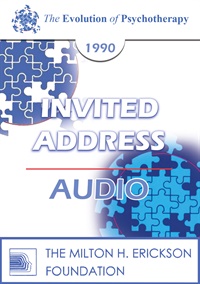
- Average Rating:
- Not yet rated
- Topic Areas:
- Invited Addresses | Buddhism | Meditation, Spirituality and Yoga | Ericksonian Hypnosis and Therapy Techniques | Psychotherapy | Strategic Therapy | Art and Creativity | Case Discussions
- Categories:
- Evolution of Psychotherapy | Evolution of Psychotherapy 1990 | Pioneers in Couples and Family Therapy
- Faculty:
- Jay Haley, MA | William Glasser, MD
- Duration:
- 1 Hour 16 Minutes
- Format:
- Audio Only
- Original Program Date:
- Dec 12, 1990
- Short Description:
- Drawing parallels between Zen Buddhism and strategic therapy, this session emphasizes present-moment focus, action over analysis, and the value of personal relationships. It highlights similarities with Milton Erickson’s directive, practical methods. Topics include the pursuit of sudden change in therapy and the role of power dynamics in the therapeutic process. Examples of cases and Zen stories are compared. Zen, systems theory, and Erickson's strategic therapy are brought together.
- Price:
- $15.00 - Base Price
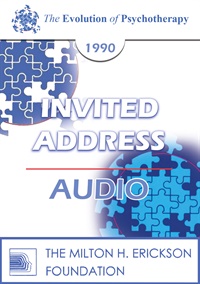
- Average Rating:
- Not yet rated
- Topic Areas:
- Invited Addresses | Psychotherapy | Storytelling | Metaphors | Abuse | Family Therapy | Strategic Therapy
- Categories:
- Evolution of Psychotherapy | Evolution of Psychotherapy 1990 | Pioneers in Couples and Family Therapy
- Faculty:
- Cloe Madanes, HDL, LIC | Mary Goulding, MSW
- Duration:
- 1:35:43
- Format:
- Audio Only
- Original Program Date:
- Dec 12, 1990
- Short Description:
- Madanes discusses the evolution of psychotherapy toward self-help and family-based approaches. Emphasizing the family as a healing system, she outlines strategies for addressing anxiety, abuse, and reconciliation through an 18-step program grounded in empathy, hope, and non-violence. Case studies illustrate practical interventions, and the discussion includes the use of self-disclosure, the limits of medication, and the importance of confronting violence and substance abuse in family systems. Includes response from Mary Goulding.
- Price:
- $15.00 - Base Price
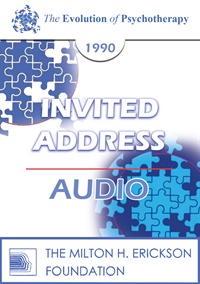
- Average Rating:
- Not yet rated
- Topic Areas:
- Invited Addresses | Social Issues | Family Therapy | History of Psychotherapy | Psychotherapy | Children and Adolescent Therapy | Constructive Narrative | Cross-Cultural Therapy | Narrative Therapy
- Categories:
- Evolution of Psychotherapy | Evolution of Psychotherapy 1990 | Pioneers in Couples and Family Therapy
- Faculty:
- Salvador Minuchin, MD | Mara Selvini Palazzoli, MD
- Duration:
- 1 Hour 26 Minutes
- Format:
- Audio Only
- Original Program Date:
- Dec 13, 1990
- Short Description:
- Minuchin reflects on how family therapy has evolved alongside shifting political and cultural tides. He contrasts early structural models with later constructivist approaches, noting how each reflects assumptions about power, class, and expertise. Using a case of a mother navigating child welfare systems, he illustrates the complexities of working with underserved families and calls for culturally responsive, socially aware interventions that don’t ignore systemic constraints.
- Price:
- $15.00 - Base Price
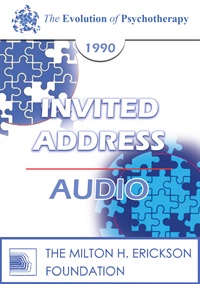
- Average Rating:
- Not yet rated
- Topic Areas:
- Invited Addresses | Experiential Therapy | Family Therapy | Psychotherapy
- Categories:
- Evolution of Psychotherapy | Evolution of Psychotherapy 1990 | Pioneers in Couples and Family Therapy
- Faculty:
- Carl Whitaker, MD | Paul Watzlawick, PhD
- Duration:
- 1 hour 29 minutes
- Format:
- Audio Only
- Original Program Date:
- Dec 13, 1990
- Short Description:
- The infrastructure of the family as an organism can be altered. A symbolic experience is a difference that makes a difference. This lecture describes how to precipitate a symbolic experience. Dr. Carl Whitaker redefines family therapy with his experiential approach, emphasizing therapist authenticity, intuitive practice, and strategic vulnerability while balancing boundaries and genuine connection.
- Price:
- $15.00 - Base Price
Tags: Carl Whitaker Family Therapy Psychotherapy Adaptation Attunement Autonomy Behavioral Change Emotional Growth Expressive Communication Flexibility Learning Observation Problem-Solving Therapy Rapport Receptive Communication Resilience Self-Discovery Storytelling Strategic Interventions Tailoring Therapeutic Alliance Therapeutic Experimentation Validation Experiential Therapy Adaptive Learning Challenge Cultivation Experiential Learning Naturalistic Change Phenomenological Approach Self-Organizing Change Unconscious Resources Utilization



